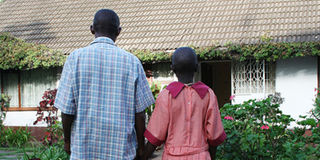Is this how to be a Kenyan man?

PHOTO | ZACHARIA CHILISWA
Media reports these days would make one think there is a gender war in the country. In a matter of three days, about 15 Kenyans have lost their lives because some man or another was “jilted”, “betrayed”, “cheated” or “cheated on”. But can love alone, or lack of it, justify massacre?
Are Kenyan men suffering from an identity crisis, as most armchair analysts would say? Or it is just that society is directionless, with people lacking the skills and ken to deal with key issues and feelings such as love, trust, faithfulness, friendship, loss, poverty, etc.
Telling title
In 2009, Kwani? Trust published an anthology of poetry with a telling title: To be a Man, a title that I find quite relevant in reminding us about the status of Kenyan men.
The verses in this anthology deal with the vexed question of what it means to be a man in various ways.
There are those who, often cheekily, suggest that the “crisis of manhood” is an invention of modernity.
Others suggest it is as a result of the erosion of traditions that had always elevated and pressured a man to be successful, rich, well-educated, living in a good neighbourhood and be sophisticated.
Mboga Patroba in To be a Man captures the clichés, stereotypes and typologies: “What does it mean to be a man?/ Is it having a deep husky voice?/ Is it having big muscles, to tussle weaker men and handle ladies, addicted to the ever-changing/ media opinion on what makes a man sexy?”
Manhood means different things to different people, but what we urgently need to question is what it means to be a man and debate it in relation to how men are relating to women, how men live with and treat their daughters, sisters, wives, mothers, aunts, girlfriends or female colleagues, etc.
Evidence increasingly suggests that whilst men feel emasculated, women, beginning with girls, are victims of men’s violent acts; violence that supposedly underlines men’s anger and alienation.
In many parts of the world, girls are an endangered species. In India, for instance, the high cost of dowry when girls marry discourages families from bringing up daughters.
The state policy in China that recommends one child per family has generally seen couples favouring boys. In many parts of Africa, boys are still seen as the custodians of the family, clan or community heritage. They are supposed to carry the lineage.
Little or no value
Women are spoken of and treated as strangers who will be married elsewhere and therefore have little or no value for the family and community.
This attitude towards women; this cavalier treatment of a larger proportion of our society, explains the very disturbing incidents of child molestation, rape of schoolgirls, arranged marriages which put pre-puberty girls into inescapable relationships with men the age of their grandparents, the economic disenfranchisement of married women who are denied their right to own or inherit property, the maiming of wives by husbands and endless media reports of the murder of women and girls by the men in their lives.
How has our society come to be like this? How can we continue to alienate, disempower and betray, knowingly or even unknowingly, so many women?
This is not to say that the boy-child and men are not victims of violence: it is simply to suggest that the sheer numbers of women whose lives are wasted in this country is untenable. How can society live so barbarically?
The violence that Kenyan women suffer should worry all and sundry in this country. This state of siege in which many Kenyan women live should prick our conscience and remind us of something valuable that we seem to be losing quite fast: our humanity.
Does this violence suggest just a collapse of a moral order or is it suggestive of a deeper problem; a problem of a seeming collective inability to recognise the human value of others?
We should be asking – whenever we read in the papers or watch on TV or listen to radio news of “another” baby girl raped by her father or woman killed by her husband – whether in our schools, churches, community groups or homes we are teaching the values of care, love and responsibility for others.
Objectified and owned
Fathers, aunts, mothers, sisters, brothers, teachers, pastors, or social workers out there, are you insisting to the young, especially boys, that girls or women are more than just individuals to be sexually objectified and owned as girlfriends or wives?
Or to be spanked or killed when they do not do as men wish?
What then are we teaching our young men? What questions about the wellbeing of the society disturb the minds of our elders when they ponder the future of their children and grandchildren?
Do such ideals as kindness, compassion, sympathy, peace and love really mean anything any more if the lives of hundreds of Kenyan women, young and old, continue to be lost in such a casual manner?
How can wife-battering, rape, intimidation, or murder be the attributes that define a society; nay, that define our men? How can the tyranny of the few stalk the land so sinisterly?
Tom Odhiambo teaches literature at the University of Nairobi.




